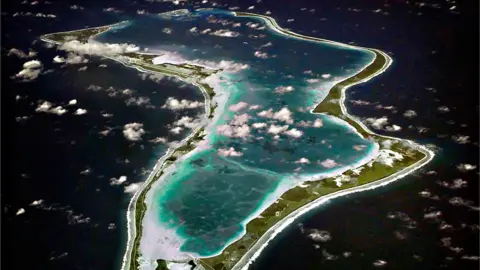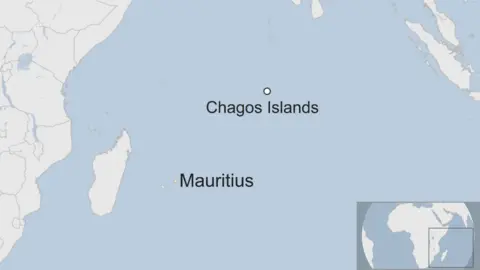The UK cedes sovereignty of the Chagos Islands to Mauritius

 Alamy
AlamyThe UK has announced that it is relinquishing sovereignty over a remote but important archipelago in the Indian Ocean after more than half a century.
The deal – reached after years of negotiations – will see the UK hand over the Chagos Islands to Mauritius in a historic move.
This includes the tropical island of Diego Garcia, which is used by the US government as a military base for naval vessels and long-range bombers.
The announcement, made in a joint statement by the UK Prime Minister and the Mauritian Prime Minister, ends decades of often contentious negotiations between the two countries.
The US-UK base will remain on Diego Garcia – an important factor that allows the agreement to move forward at a time of growing geopolitical tensions in the region between the West, India, and China.
The deal is still under finalization, but both sides have promised to finalize it as soon as possible.
“This is an important moment in our relationship and a sign of our continued commitment to peaceful conflict resolution and the rule of law,” read a statement by UK Prime Minister Keir Starmer and Mauritius Prime Minister Pravind Jugnauth.
The leaders also said they are committed to “ensuring the long-term, secure and effective operation of the existing base in Diego Garcia that plays an important role in regional and global security”.
The agreement will also “address the mistakes of the past and demonstrate the commitment of both parties to support the welfare of the Chagossians”.
The deal will also see the UK provide a package of financial support to Mauritius, including annual payments and infrastructure investment.
Mauritius will be able to start a resettlement program in the Chagos Islands, but not in Diego Garcia.
There, the UK will guarantee the operation of the military base for an “initial period” of 99 years.
US President Joe Biden welcomed the “historic agreement”, saying it was “a clear sign that through dialogue and cooperation, countries can overcome long-standing historical challenges to reach peaceful and beneficial outcomes”.
But Frankie Bontemps, a second-generation Chagossian in the UK, told the BBC he felt “betrayed” and “angry” by the news because “Chagossians have never been involved” in the negotiations.
“We remain powerless and voiceless in deciding our future and the future of our country”, he said, and asked for the full inclusion of the Chagossians in the drafting of the agreement.
In recent years, the UK has faced increasing international isolation over its claim to what it calls the British Indian Ocean Territory, Various organs of the United Nations, including its highest court and general assembly, are closely aligned with Mauritius and what they want the UK to contribute others have called “its last colony in Africa”.
The Mauritian government has long argued that it was illegally forced to cede the Chagos Islands to the UK in 1968.
By then, the British government had negotiated a secret deal with the US, agreeing to lease the largest island, Diego Garcia, for use as a military base.
Britain later apologized for forcibly removing more than 1,000 islanders from across the archipelago and promised to cede the islands to Mauritius when they were no longer needed for strategic purposes.
But until recently, the UK insisted that Mauritius itself had no legal claim to the islands.

For decades, the small island nation of Mauritius has struggled to garner any major international support on the issue.
A number of Chagos islanders, who were forced to leave their homes in the late 1960s and early 70s, he repeatedly took the British government to court.
But recently international opinion began to change.
African countries began to speak with one voice on this issue, pushing the UK hard on the issue of decolonization.
After that Brexit left many European countries reluctant to continue to support the UK’s position in international forums.
The Mauritian government continued to attack, blaming UK government for verbal threats.
And the Mauritians began to mount a campaign that became complex – in the UN, in the courts, and in the media – even landing and planting a flag on an island in the archipelago without British consent.
The negotiations that led to Thursday’s deal began under the previous UK government.
But the timing of this success shows a growing sense of urgency in international affairs, not least regarding Ukraine, with the UK willing to remove the Chagos issue as an obstacle to gaining more support around the world, especially in African countries, with a second hope. Trump’s presidency is approaching.
The people of the Chagos Islands themselves – some in Mauritius and Seychelles, but others who live in Crawley in Sussex – do not speak with one voice about the fate of their country.
Some are determined to return to the isolated islands, others are more focused on their rights and status in the UK, while others argue that the situation in the Chagos Islands should not be resolved by outsiders.
Backlash from some voices in the UK can be expected, although successive Conservative and Labor prime ministers have been working towards the same goal.
Senior leadership candidate Tom Tugendhat called the deal “a shameful withdrawal that undermines our security and leaves our allies exposed”.
But there can be no doubting the historical significance of this period.
Half a century or so after the UK gave up control of almost all of its world empire, it has finally agreed to give up one of the last pieces. Do it reluctantly, perhaps, but also quietly and legally.
The remaining British overseas territories are: Anguilla, Bermuda, British Antarctic Territory, British Virgin Islands, Cayman Islands, Falkland Islands, Gibraltar, Montserrat, Pitcairn, Saint Helena, Ascension and Tristan da Cunha, South Georgia and South Sandwich Islands, Turks and I – Caicos Islands. There are also two independent territories in Cyprus under British rule.
Source link




